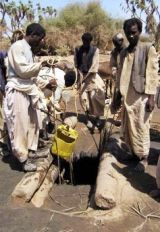Beja Congress calls for ICC investigation of Port Sudan incident
May 16, 2009 (LONDON) — The Beja Congress of east Sudan issued an appeal to an
international lawyers’ group to bring a case before the International
Criminal Court (ICC).
 Abu Amna, a representative of the organization, sent a statement to
Abu Amna, a representative of the organization, sent a statement to
Sudan Tribune urging justice for a massacre allegedly committed in
Port Sudan on January 28, 2005. On that day, 22 Beja citizens
including women and children were shot dead and more than 400 injured
during a peaceful protest.
Amna would like the International Association of Democratic Lawyers
(IADL) to help bring a criminal case before the ICC. The IADL is an
association founded in 1946 in Paris by lawyers who had participated
in the Nuremberg Trials conducted against adherents to the regime of
German leader Adolf Hitler.
Sudanese President Omer Al-Bashir is already wanted on seven counts of
war crimes and crimes against humanity. The ICC prosecutor further
vows to charge him with three counts of genocide for targeting three
ethnic groups in Darfur.
“It is not only in Darfur where Bashir and his government are
practising war crimes, crimes against humanity and genocide. Even in
the north-eastern Sudan similar crimes are taking place, but not in
that extent,” said Amna.
The Rome Statute, the treaty governing the ICC, allows the court
prosecutor to “initiate investigations proprio motu on the basis of
information on crimes within the jurisdiction of the Court,” which
means he can take investigative action on his own.
But in the case of crimes committed in Darfur, Chief Prosecutor Luis
Moreno Ocampo undertook the investigation because he was ordered to by
the UN Security Council. The Beja Congress would like to see the
lawyers’ association “to make it possible that the Security Council of
the United Nations’ intervenes and refers the case to the ICC.”
On the day of January 28, 2005, government forces brought by plane
from Khartoum committed the shooting in Port Sudan, said Amna. “The
governor of the Red Sea state admitted later, that the demonstration
of the Beja people was peaceful and that there was just a
misunderstanding,” he said.
Amna pointed to the living conditions of the people inhabiting the
region, saying “The sufferings of the Beja people in the north-eastern
Sudan are just unbelievable.”
According to malnutrition indicators, eastern Sudan remains the worst
of all the states in the country. In Red Sea state only 33 percent of
people have access to safe drinking water, and maternal and child
mortality rates are high.
Referring to these hardships, the Beja Congress figure said “The
government in Khartoum left them alone, so that they can face their
ultimate extinction in a few years.”
“The statistics reveal, that their number is drastically diminishing.
Some Beja tribes have already completely vanished from earth. The rest
may follow, if the civil societies and the global NGOs do not
intervene.”
He added that the government accelerates this process by killing the
Beja people using its security forces and land mines.
The Beja people have their own language and the Beja Congress is one
of the oldest political bodies in the Sudan. The group took up arms in
1994.
(ST)
